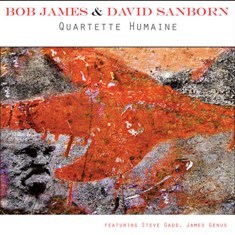
Bob James and David Sanborn
Quartette Humaine
OKeh ****
Smooth jazz can be like a soap opera, a waterfall of melodrama and over-emotion, and the glorious instrument that is the saxophone can be reduced to a gaudy toy, a piano like something made tiny that you might get out of a cracker. Both James and Sanborn are easily identified with the genre but one thing is clear on listening to Quartette Humaine why lumping genres indiscriminately on to musicians is so dangerous: Quartette Humaine is not a smooth jazz record at all. James and Sanborn are reunited, with drum deity Steve Gadd also returning (the three appear on their hit album Double Vision), with James Genus in place of Marcus Miller, and Javier Diaz joining on one track although the cast is smaller than Double Vision, and there are no vocals from anyone, least of all Al Jarreau who appeared on the 1986 album.
James has arranged the tunes and both Sanborn and James produce rather than Tommy LiPuma on their earlier record. Engineer Ken Freeman captures Genus’ bass beautifully especially on the early tracks, and it’s worth mentioning the immaculate intimate sound of this album irrespective of what you feel about any other aspect of the music and the tunes here. Not many albums get even close to how Quartette Humaine sounds, a warm acoustic jazz album where you can hear everything. Pure ambrosia. I wish more did. Last year a two-CD anthology of Sanborn’s Warner albums Then Again was an opportunity to recall how tender a player Sanborn is. ‘Lisa’ and ‘Hideaway’ and the Don Grolnick arrangement of ‘Lotus Blossom’ on the second of the Then Again discs clearly showed that, and Quartette Humaine emphasises this aspect of Sanborn’s artistry without cutting him adrift from the band setting as his more commercial work often did. The arrangements are better here than on many of Sanborn’s Warner albums, and James is a sympathetic accompanist: the music speaks. Not sure about the inclusion of the standard ‘My Old Flame’ which comes across as a bit laboured, but everything else, written mostly by Sanborn and James separately, works remarkably well. Don’t let the billing of Quartette Humaine as a musical tribute to Dave Brubeck, especially of his recordings with Paul Desmond hinder your approach to listening to this album too much (only ‘Follow Me’ corresponds with such a concept). Sanborn, more a Fathead Newman man, never sounds like Desmond here, and James is a very different pianist to Brubeck with more of an R&B and jazz-rock sound. So this is an odd framing for the album the title of which takes on from Alice Soyer’s ‘Geste Humain’. Above all this reunion is about great material and a relaxed romantic vibe with Sanborn playing his heart out. Go straight to ‘Genevieve’ to hear him at first hand. You’ll feel as if you’re sat at a table in front of the stand.